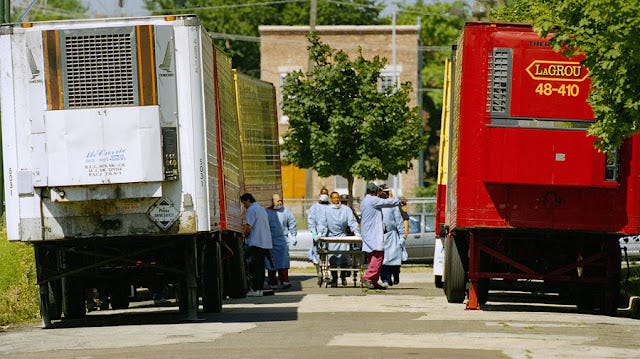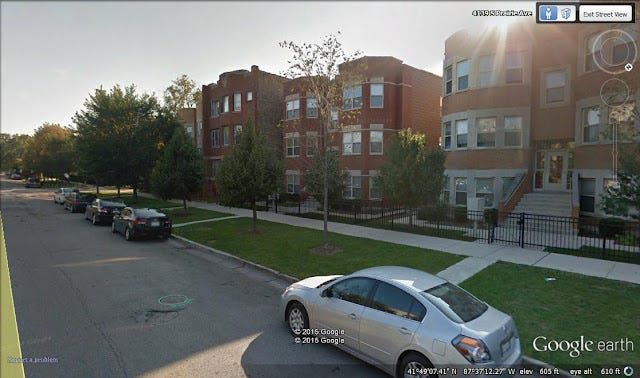Chicago Heat, Thirty Years Later
Every so often something happens that reminds us of the segregation and inequality of American society. When did "it sucks to be you" become an acceptable point of view?
Chicago had so many dead bodies piling up during its 1995 heat wave that the city recruited refrigerated trucks to handle the overflow. Source: npr.org
(Note: this is a post modified and updated from one written ten years ago on the 20th anniversary of the 1995 Chicago heat wave. I included some new reflections and context on that time. More than anything, however, I want to make clear that segregation and inequality benefits some people but also exacts deadly costs on others. Please take a look. -Pete)
Thirty years ago today, the intense heat in Chicago mercifully cooled down to a high of 94 degrees, signaling an end to one of the worst heat waves in the city’s history.
I vividly remember the day three days earlier when I experienced the single hottest day I ever felt, anywhere. That was when Chicago topped out at a very humid 106 degrees, with a heat index that made it feel like 125. I remember leaving Chicago's City Hall to walk outside, so I could feel what the terrible heat felt like.
I don’t know exactly why, but I decided to immerse myself in the heat, to take it all in. I walked the nearly two-mile journey from City Hall to Navy Pier on the lakefront, a place known for its cooling summer breezes off Lake Michigan. Meteorologists were already noting that no lake breeze was forming during this heat wave; in fact, there was no breeze at all. I remember looking at a still and silent Lake Michigan as if it was the world’s largest hot bath.
The humidity was absolutely oppressive. I’ve experienced 110+ degree temperatures during visits to Phoenix and Las Vegas before, but they simply do not compare with humid heat. I’ve experienced the stifling heat and humidity of the Deep South also. Without a doubt, 112 degrees in the desert is very hot. However the air retains a lightness to it. Humidity is heavy; it’s like adding weight on your back while trying to tolerate the heat.
Within a week's time, the cumulative effect of unrelenting heat and humidity led to more than 700 deaths in Chicago from heat strokes, dehydration and other heat-related illnesses., Almost all of them poor, without access to air conditioning in their homes or nearby, living in the most distressed neighborhoods in a city that was entirely unprepared to handle the onslaught. The vast majority of the heat-related deaths came from residents of the city's South and West sides. The 1995 Chicago heat wave is now known as one of the deadliest natural disasters in U.S. history, surpassed in the years since then only by Hurricane Katrina, though few have ever heard of it.
It was around this time that the notion of a bifurcated Chicago, one of deep economic and social differences between haves and have nots, began to solidify in my mind.
Chicago public radio station WBEZ’s Reset with Sasha-Ann Simons gathered some rememberances of the event, aired last week. For further understanding of the event, I'd highly recommend reading Heat Wave: A Social Autopsy of Disaster in Chicago by Eric Klinenberg. It’s mentioned in my recent list of books that influenced my perception of the Midwest.
What do I remember? At the time I was 30 with a wife and five-year-old daughter living in the Auburn-Gresham neighborhood on the South Side. Our apartment building, an 18-unit "garden-style" apartment building near 83rd and Ashland, was not equipped with central air. However, we had two window a/c units, in the living room and in the master bedroom. It was enough to cool the entire apartment (it was a 2-bedroom apartment that was maybe 700 square feet) and allow us to escape the intense heat gripping the city.
That wasn't the case for much of the city surrounding us. Hustle men street vendors were selling bottles of water on the street for $3 a pop. People were draping towels over their heads to avoid the sun. Street life disappeared.
Local television reporters commented on the intensity of the heat wave, but very little was said about the growing tragedy, at first. I remember reporters stating that hospitals were closing up their emergency rooms because they were overrun, and then saying that bodies were piling up at the morgue, and then at hospitals. At first no one wanted to attribute the deaths to the heat wave; city officials were saying that the deaths were "coincidental" and any connection to the heat wave was "inconclusive".
After a few days, fire trucks were pouring water on downtown drawbridges to keep them from locking up. Streets were buckling. The city scrambled to open up public buildings, even overnight, to people who didn't have air conditioning.
To people from warmer climates in the South and West, this may be difficult to understand. How could such a tragedy happen? But Klinenberg and others made astute points about the physical and sociological natures of the disaster. Physically, Chicago is without question a northern city, and its building construction -- overwhelmingly brick in the aftermath of the Chicago Fire in 1871 -- is meant to retain heat, not release it. This works well in the winter months and keeps everyone safe and comfortable in frozen January, but does not have the same impact in July.
Much of Chicago's residential construction looks like this, in Washington Park:
Or like this, in Humboldt Park:
Neither type is conducive to ventilation. Residents who had the ability to add an a/c unit or two, like I did, or upgrade to more contemporary units, were able to survive the event without blinking an eye. And often the feeling is by those who are able to do this is that others can do it as well.
The older brick buildings that were turning into ovens were heavily concentrated in high-crime communities during a high-crime era. This was at the height of Chicago's crack-era crime wave. Violent crime, particularly murders, were at the highest levels in the city’s history — even compared to today, when Chicago is often vilified nationally for its crime. Thirty years ago, the city regularly reported more than 800 murders annually throughout the 1990’s, before reporting half as many in the 2010’s. The national pandemic crime spike saw murders briefly approach the 1990’s levels, but has since fallen back again.
At the time, an open window or two could be an invitation for a home invasion. Would you choose that, or try to wait out the heat wave?
That decision cost many people their lives.
Since then, the city has done a much better job of getting in front of heat waves. It now has a system for opening up public spaces as cooling centers. Many places that lacked air conditioning prior to the '95 heat wave, like park fieldhouses, now have air. The city is good about getting the message out through the local media about cooling centers, and asking people to check on vulnerable family members.
Unfortunately, the '95 heat wave is hardly ever brought up as a seminal or watershed event in Chicago history, in the way that the Fire was, or even the '68 Democratic Convention riots. I think that a lot of policymakers who were around at the time experienced a sense of shame about the disaster; how was it, they might ask themselves, that people could live so differently from them that it cost them their lives? Rather than answer that question, they chose to bury it and move on. In this sense, it's not unlike the Tulsa Race Riot of 1921, which was largely forgotten by many Tulsans but was kept in the public eye by elderly victims and witnesses decades later.
Doing better by the city's residents is definitely a positive outcome. However, by not articulating why the change is significant means that a similar event could take place again.






Growing up in the 60s, without a/c, I can remember my parents and grandparents sleeping on the porch and my sister and I sleeping in a tent in the yard during those 100' heatwaves. A few old timers told me that in Newark, Elizabeth, and NYC parks would be full of people who dragged mattresses out with police on foot patrol trying to see that they could get sleep before going to work the next day [pre & post WWII]. My Chicago cousins were visiting with us that week in '95, the New Jersey shore ALWAYS had a breeze.